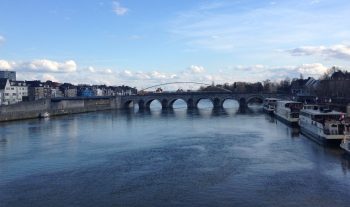Learning Limburg Dialect Posted by Karoly Molina on Nov 16, 2016 in Culture, Dutch Vocabulary
Limburg is the southern most region of the Netherlands that borders with Germany and Belgium. It has slightly over one million people and ranks 6th in population size in the country. During the past three years that I’ve lived in Limburg, I’ve learned that it is a region set apart from the rest of the country, particularly from the Randstad area. There are a few reasons as to why this is the case, but one stands out for me: the language.

Maastricht (personal photograph)
Although the official language is Dutch (unlike Friesland where the official language is also Fries), the majority of people living in Limburg speak plat or dialect commonly known as Limburgs. Although the dialect has one name, the reality is that there are several dozen dialects spoken in the region.
The most popular dialect is Mestreechs which is spoken in Maastricht or Mestreech. This dialect is a blend of the three language influences in the city: Dutch, French and German. Words are elongated a bit and it sounds like if people are singing rather than talking.
Kerkrade’s dialect is a blend of Dutch and German, and is called Kirchröadsj Plat. Sound-wise, it is more similar to German than it is to Dutch. The city of Herleen also has its own dialect and is also very similar to German. Roermond and Venlo also have their own versions of plat as well as many small towns throughout the region.
The diversity in dialects makes it very complicated to learn or even just understand, however, I have managed to make a few observations that would be helpful to anyone visiting the region:
- ui = oe
Many words in Dutch that have ui are pronounced with oe instead. Some examples are boeten instead of buiten, thoes instead of thuis, and doem instead of duim.
- ij = ie
Another general change is ie for ij. Kijken is pronounced as kieke, krijt is pronounced as kriet, and mijn is pronounced mien.
- sch = sj
Many words that have a sch are pronounced with sj such as sjoon isntead of schoenen, boetsjappen instead of boodschappen, and sjtom instead of stom.
- enne
This is perhaps the handiest word to learn in plat. Enne is some sort of “hello, how are you?” type of word. When you see someone, you can just say enne and the conversation just starts.
These three observations are not a rule. There are many words that just have a completely different word in plat, and like I said before, there are variations in different cities and towns.
If you are interested in learning more about plat, I have a few suggestions of where you can learn:
- The “Visit Maastricht” Facebook page launched last week “dialect op dinsdag” and they post a word in Mestreech with a recording of the pronunciation.
- The website “mijnwoordenboek” has a section dedicated to Limburgs. The only disadvantage is that it doesn’t specify too much the different regions. However, it is a very handy source.
- Another Facebook source is a page called Kal Plat which means Talk Dialect. There are many images and posts about different dialects.
- Last but not least, the following video has a short but very ample explanation of some words in plat and the differences in the regions.
Useful Vocabulary (in plat)
remunj– Roermond
stroate– streets
kefee- bar
sjoeverechtig– shivery
kaad- cold
pitse- beer

Build vocabulary, practice pronunciation, and more with Transparent Language Online. Available anytime, anywhere, on any device.
About the Author: Karoly Molina
Since I was a little girl, I was fascinated with languages and writing. I speak English, Spanish, Italian, Dutch and a little bit of French. I am a writer, reader, language teacher, traveler, and a food lover! I now live in The Netherlands with my husband Riccardo, our cat Mona, and our dog Lisa, and the experience has been phenomenal. The Dutch culture is an exciting sometimes topsy-turvy world that I am happily exploring!




Comments:
Marie-Jacqueline:
First, thank you very much for writing a blogpost about the dialects of the province I live in, Limburg.
Born and raised in Roermond I speak Remunjs.
It is the language of my emotions, my motherltongue.
My compliments on the research you did and to make it interesting for the “outsider”.
There is a site of the Limburgish Academy Foundation
Its site has the option Dutch, English and Limburgish.
You can find the history, some of the special features in tonality enz.
http://www.limburgs.org/en/limburgish/characteristics
Karoly G Molina:
@Marie-Jacqueline Thank you so much Marie for the compliment and for the link so we can all get more information. I think learning or at least understanding Limburgs is an important aspect of living in this region. I hope one day to be able to at least understand most of what people say in dialect!
Phyll Martin:
@Karoly G Molina Hooray. As I live in Australia, I can now relearn my Limburgs Language. Thank you from the bottom of my heart. I still have family in Maastricht, Roermond and Belgium, and would love to go and see them once more and be able to converse with them in our native tongue. My youngest son would also like to learn.